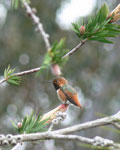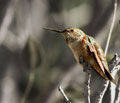Males
The male Rufous Hummingbird is about 8.5 centimetres long and weighs close to 3 grams. It has a straight, slender, black beak. Its face, back, sides, rump, tail, abdomen and under-tail coverts are reddish-brown in colour.  Rufous Hummingbird (male) Selasphorus rufusCredit: Chuck Rogers(Size: 146.50 kb) |
It sports a shiny green cap on the top of its head. Sometimes its back is mottled with green and its wings are dark. The tiny white speck at the edge of its eyes and its scarlet throat contrast with its black eyes and white breast. The tips of the feathers in its forked tail are dark. The males are much more vocal than the females.
 Rufous Hummingbird (female) Selasphorus rufusCredit: Chuck Rogers(Size: 147.24 kb) |
Females and immature birds
The female is slightly larger than the male and a bit less colourful. It is about 9 cm long and weighs close to 4 grams. The plumage on its back, crown and wing tops is bronze-green. Reddish-brown zones brighten its sides and tail. Sometimes, tiny red and green marks are visible on the throat. Immature males resemble adult females, with more reddish-brown on the rump and lower back.
 Rufous Hummingbird Selasphorus rufusCredit: Jeff Fennell(Size: 75.53 kb) |
Nests
Female Rufous Hummingbirds build their nests in trailing plants, bushes or even good-sized trees. The nest resembles an open cup. The female generally has one clutch of eggs per year, but sometimes two. The two eggs are incubated for about 16 days. The Rufous Hummingbird sometimes nests in colonies. Up to 20 nests have been found in the same sector.
 Rufous Hummingbird Selasphorus rufusCredit: Frank Leung(Size: 53.57 kb) |
Where can it be seen?
The Rufous Hummingbird lives aloft where there are flowers, in forests, bushy areas and prairies. It feeds mainly on nectar, sap and insects. It is often a regular at feeders. It is very territorial.
To learn more about its range, follow this link.
What more can we say?
To learn about a research project on the Rufous Hummingbird, follow this link.
To discover a few characteristics of the Rufous Hummingbird, follow this link.
|

